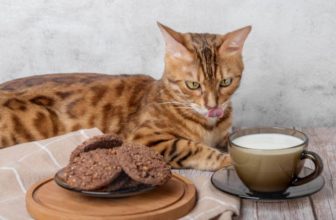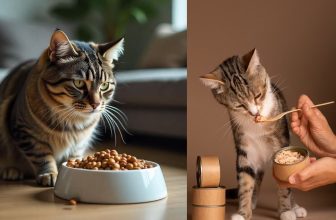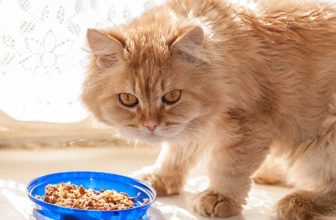Can Cats Eat Bananas? Safe Fruit Treat Guide

Can Cats Eat Bananas? Here’s What You Need to Know
Yes, cats can eat bananas in small amounts. Bananas are not toxic to cats, but they are not a natural part of a feline diet. Since cats are curious, they may show interest in human foods like bananas. While bananas contain nutrients such as potassium, cats process fruits differently than humans.
Cats are obligate carnivores, meaning they need meat to stay healthy. So, can cats eat bananas safely? Yes — but only as an occasional treat. A few small banana slices are fine but never replace their regular, protein-rich meals. Always watch how your cat reacts and focus on keeping their main diet balanced and meat-based.
Cats And Fruits
Cats are curious creatures, often exploring new foods with interest. Many cat owners wonder if their furry friends can enjoy fruits like bananas. While it’s common to see cats nibbling on plants, fruits in their diet are rare. Understanding which fruits are safe is important for their health. Let’s explore the world of cats and fruits, focusing on bananas.
Feline Diet Basics
Cats are obligate carnivores, relying on meat for essential nutrients. Their diet mainly consists of protein and fat. Unlike humans, cats don’t need carbohydrates in large amounts. Here’s a simple breakdown of their dietary needs:
- Proteins: Essential for muscle growth and repair.
- Fats: Provides energy and supports cell function.
- Water: Important for hydration and overall health.
- Vitamins and Minerals: Supports various bodily functions.
While fruits are not necessary, they can be an occasional treat. It’s crucial to ensure fruits are safe and given in moderation. Some fruits may cause digestive issues if consumed in large amounts. Always introduce new foods gradually and observe for any adverse reactions.
Safe Fruits For Cats
Not all fruits are safe for cats. Some can be harmful or toxic. Fortunately, there are a few fruits that are generally safe:
| Fruit | Notes |
|---|---|
| Bananas | Rich in potassium, safe in small amounts. |
| Apples | Remove seeds and core; offer as a small treat. |
| Blueberries | Low in calories, good as an occasional snack. |
| Watermelon | Seedless and rind-free, hydrating for cats. |
Always remove seeds and cores when offering fruits. This prevents choking hazards and digestive issues. It’s wise to consult your vet before introducing new foods. Remember, moderation is key to keeping your cat healthy.
Bananas: A Quick Look
Cats are curious creatures, often intrigued by new foods. Bananas are a common fruit in many households, and pet owners might wonder if they can share this snack with their feline friends. While cats are obligate carnivores, meaning their diet primarily consists of meat, occasional fruits might seem harmless. Understanding the nutritional content and potential effects of bananas on cats is crucial. This exploration offers insights into whether bananas fit into a cat’s diet and highlights the nutritional value and benefits for humans.
Nutritional Value
Bananas are rich in nutrients, making them a popular choice among health-conscious individuals. Packed with vitamins such as Vitamin C and Vitamin B6, they contribute to overall well-being. High levels of potassium support heart health and muscle function. They also contain dietary fiber, aiding in digestion.
In addition to vitamins and minerals, bananas are low in fat and calories. This makes them an appealing option for those watching their weight. Here’s a closer look at the nutritional breakdown:
| Nutrient | Amount per 100g |
|---|---|
| Calories | 89 |
| Potassium | 358 mg |
| Vitamin C | 8.7 mg |
| Vitamin B6 | 0.4 mg |
Despite their benefits, bananas are not essential in a cat’s diet. Cats require animal-based nutrients for optimal health. While bananas contain beneficial vitamins, they don’t offer the proteins cats need.
Benefits For Humans
Bananas offer numerous health benefits for humans. Rich in potassium, they help maintain normal blood pressure. This can reduce the risk of heart disease. Vitamin B6 in bananas plays a vital role in brain health. It aids in producing neurotransmitters, which improve mood and cognitive function.
Beyond vitamins and minerals, bananas contain antioxidants. These combat free radicals, reducing oxidative stress. This may lower the risk of chronic diseases. Bananas are also convenient snacks due to their portability and natural packaging. They require no preparation, making them ideal for busy lifestyles.
- Boosts energy levels
- Improves digestion due to fiber
- Supports heart health
While bananas are beneficial for humans, it’s important to remember that cats have different dietary needs. Sharing human food with cats should be done cautiously. Understanding these differences ensures pets remain healthy and happy.
Cats And Bananas
Cats are curious creatures with unique tastes. Owners often wonder if their feline friends can eat certain human foods. One common question is, “Can Cats Eat Bananas?” This is a valid concern for pet lovers. Cats have specific dietary needs. Understanding what is safe for them is crucial. Bananas, a popular fruit for humans, might catch a cat’s interest. But is it safe for them? Let’s explore the relationship between cats and bananas.

Are Bananas Safe?
Bananas are not toxic to cats. They are safe in small amounts. This fruit is full of vitamins and minerals. It contains potassium, which is good for heart health. But cats are obligate carnivores. They need meat to get nutrients. Bananas are not part of their natural diet. Feeding bananas should be an occasional treat. Here are some points to consider:
- Small portions: Always give a tiny slice.
- Observe reactions: Watch for any allergic signs.
- Remove peel: The peel can be hard to digest.
It’s essential to monitor how your cat reacts. Some may enjoy the taste. Others might not show interest. Cats have different preferences. Always consult a vet for dietary changes.
Potential Risks
While bananas are safe, there are potential risks. Overfeeding can cause issues. Cats have small stomachs. Too much banana can lead to digestive problems. Here are some risks to be aware of:
| Risk | Description |
|---|---|
| Upset stomach | Too much banana can cause vomiting or diarrhea. |
| Weight gain | Bananas have sugar, leading to weight issues if overfed. |
| Choking hazard | Large pieces can cause choking. |
It’s crucial to feed bananas in moderation. Always cut them into small pieces. This prevents choking. If your cat shows any adverse reactions, stop feeding bananas immediately. Keeping your pet safe is always the priority.
Signs Of Allergies
Cats often express curiosity about different foods, and bananas are no exception. Bananas are rich in nutrients like potassium and vitamins. But, can cats eat them safely? Understanding the signs of allergies in cats is crucial. Allergies can affect a cat’s health. Knowing these signs helps in keeping your cat safe and healthy.
Symptoms To Watch
Recognizing allergy symptoms in cats is important. Common signs of allergies include itching and skin rashes. Watch for changes in your cat’s behavior and appearance. Symptoms can vary from mild to severe. Here are some symptoms to keep an eye on:
- Excessive scratching or grooming
- Red or inflamed skin
- Swelling around the face or paws
- Vomiting or diarrhea
- Runny nose or sneezing
Monitoring these symptoms helps in identifying allergies early. Sometimes, symptoms can be subtle. Pay attention to changes in your cat’s routine. Keep track of any unusual behavior. Consult a vet if symptoms persist or worsen. Early detection can prevent serious health issues.
When To Consult A Vet
Knowing when to consult a vet is essential for your cat’s health. If symptoms persist, it might be time to seek professional help. Here are some situations when a vet visit is necessary:
- Persistent vomiting or diarrhea lasting more than 24 hours
- Severe itching leading to skin damage
- Swelling that does not go away
- Difficulty breathing or wheezing
- Loss of appetite or weight loss
Veterinarians can provide guidance and treatment. They can perform tests to identify allergens. Professional advice ensures your cat receives the best care. Don’t wait for symptoms to worsen. Timely intervention can save your cat from discomfort and serious health issues.
Feeding Tips
Cats are curious creatures, often exploring new tastes and textures. Among the many foods they might show interest in, bananas often raise questions for pet owners. Are bananas safe for cats? While cats are obligate carnivores, they sometimes enjoy small amounts of fruits. It’s essential to know the right way to offer bananas to them. Proper feeding ensures their health and happiness.
Serving Size
Introducing bananas to a cat’s diet needs careful consideration. Cats have different dietary needs compared to humans. A small piece can be enough for them. Too much banana can cause digestive issues. Here’s a simple guide on serving size:
- Small portions are best. A slice or two is sufficient.
- Watch for any signs of discomfort or allergies.
- Offer bananas as an occasional treat, not a regular meal.
Monitoring their reaction is crucial. Cats might enjoy the taste, but it’s not essential for their diet. Keep treats like bananas limited to prevent any health problems. Balance is key in their diet. Always observe their behavior after introducing new foods.
Preparation Methods
Preparing bananas for cats is simple but requires attention. Raw bananas are the safest option. Here’s how to make it enjoyable for them:
- Peel the banana completely. Remove any strings.
- Cut into small, manageable pieces for easy eating.
- Serve fresh. Avoid giving overripe bananas.
Avoid mixing bananas with other foods. It could create digestive issues. Plain bananas are usually well-tolerated. If your cat seems uninterested, try mashing the banana. This might make it easier for them to eat. The goal is to make the treat enjoyable, not forceful.
Alternatives To Bananas
Cats are curious creatures, often intrigued by the foods their human companions consume. One common question cat owners ask is, “Can cats eat bananas?” Bananas are not toxic to cats, but they should be given in moderation. Too much banana can cause stomach upset. Cats are obligate carnivores, meaning their diet mainly requires meat. Fruits like bananas are not necessary for their health. Offering bananas as a snack can be safe, but there are better alternatives. It’s important to know which fruits are safe for your feline friend.

Other Safe Fruits
Several fruits are safe for cats to eat. These fruits can provide a variety of nutrients. Some of these include:
- Apples: Ensure seeds and core are removed. Apples can be a crunchy treat.
- Blueberries: Packed with antioxidants, blueberries are a good choice.
- Watermelon: Remove seeds and rind. Watermelon can hydrate your cat.
- Pumpkin: Often recommended for digestion. Make sure it’s plain and cooked.
These fruits should be offered in small amounts. Always watch your cat for any adverse reactions. It’s also wise to consult with a vet before introducing new foods. Cats have unique dietary needs, so what works for one might not work for another.
Best Treats For Cats
Healthy treats can be a great way to bond with your cat. Here are some of the best options:
- Cooked Meat: Chicken, turkey, and beef are protein-rich.
- Commercial Cat Treats: Look for those with natural ingredients.
- Catnip: Many cats love catnip and it’s safe in moderation.
- Plain Yogurt: Small amounts can aid in digestion if tolerated.
These treats should not replace regular meals. They are meant to be occasional rewards. Always ensure treats are appropriate for your cat’s age and health. Keep an eye on your cat’s weight to avoid obesity. Consulting with a vet can provide personalized advice for your cat’s diet.
Expert Opinions
Cats are curious creatures, often sniffing and nibbling at things that catch their interest. This makes many cat owners wonder about safe foods. Bananas are nutritious for humans, but can cats eat bananas? Understanding the impact of bananas on a cat’s health is essential. Expert opinions, including veterinary insights and pet nutritionists’ views, provide clarity on this topic.
Veterinary Insights
Veterinarians share crucial information about feeding bananas to cats. Bananas are not toxic to cats, but they should be given sparingly. Cats have different dietary needs compared to humans.
Consider these key points:
- Cats are obligate carnivores: Their diet should be mostly meat.
- Bananas contain sugar: Too much can lead to obesity.
- Digestive issues: Some cats might struggle to digest bananas.
Moderation is key. A small piece of banana occasionally is safe. Ensure your cat shows no adverse reactions. Always consult your vet before introducing new foods. Every cat is unique. What works for one may not work for another.
Pet Nutritionists’ Views
Pet nutritionists focus on the nutritional value of bananas for cats. Bananas are rich in potassium. This mineral supports heart health and muscle function. But, for cats, their primary needs are different.
Nutritional breakdown:
| Nutrient | Benefit |
|---|---|
| Potassium | Supports heart health |
| Fiber | Aids digestion |
| Sugar | Can cause weight gain |
Considerations from nutritionists:
- High sugar content: Limit banana intake.
- Not a meat substitute: Cats need protein.
- Monitor reactions: Watch for digestive issues.
Nutritionists agree that while bananas offer some benefits, they should not be a regular part of a cat’s diet. Balance is crucial. A well-rounded diet ensures your cat stays healthy.
Frequently Asked Questions: Can Cats Eat Bananas
Is It Safe For Cats To Eat Bananas?
Cats can safely eat bananas in small amounts. They offer vitamins but should not replace a balanced diet. Monitor your cat’s reaction to ensure no allergies or digestive issues. Always remove the peel and serve in moderation for safety. Consult a vet for personalized advice on your cat’s diet.
Why Do Cats Like To Lick Bananas?
Cats may lick bananas due to curiosity or attraction to the fruit’s texture and smell. Bananas contain potassium, which some cats might find appealing. The fruit’s sweetness or novelty can also intrigue them. Always monitor your cat to ensure they don’t ingest harmful amounts.
Which Fruits Can Cats Eat?
Cats can safely eat small amounts of fruits like apples, bananas, blueberries, strawberries, and watermelon. These fruits should be fresh and free from seeds or pits. Always introduce new foods gradually and monitor for any adverse reactions. Avoid feeding grapes, raisins, or citrus fruits, as they can be harmful.
Can I Feed My Cat Raw Bananas?
Cats can eat small amounts of raw bananas safely. Bananas are not toxic to cats. They offer minimal nutritional benefits. Always introduce new foods gradually to avoid digestive issues. Remove banana peels before feeding. Consult your vet if unsure about adding bananas to your cat’s diet.
Can Cats Safely Eat Bananas?
Cats can eat bananas in small amounts. They are not harmful but offer little nutritional value.
Conclusion
Bananas are safe for cats in small amounts. They offer a sweet treat. But remember, moderation is key. Cats have different digestive systems. Too much banana can cause tummy issues. Always monitor your cat’s reaction. Some cats might love them.
Others might not be interested. It’s best to introduce bananas slowly. Consult with your vet if unsure. A varied diet keeps your cat healthy. Treats should never replace regular meals. Balance is important for their well-being. Offer bananas as a fun, occasional snack.
Your cat’s health is the priority. Keep observing their preferences and reactions.






